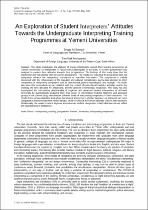| dc.contributor.author | Al-Sowaidi, Belqes | |
| dc.contributor.author | Mohammed, Tawffeek | |
| dc.date.accessioned | 2023-05-30T07:35:22Z | |
| dc.date.available | 2023-05-30T07:35:22Z | |
| dc.date.issued | 2023 | |
| dc.identifier.citation | Al-Sowaidi, B., & Mohammed, T. (2023). An exploration of student interpreters’ attitudes towards the undergraduate interpreting training programmes at Yemeni universities. Journal of Language Teaching and Research, 14(3), 597-609. 10.17507/jltr.1403.07 | en_US |
| dc.identifier.issn | 1798-4769 | |
| dc.identifier.uri | 10.17507/jltr.1403.07 | |
| dc.identifier.uri | http://hdl.handle.net/10566/8956 | |
| dc.description.abstract | This study investigates the attitudes of trainee interpreters towards their training programmes at Yemeni universities. 61 interpreters in Taiz province participated in the study. A 16-item questionnaire was designed to explore their attitudes towards their programmes. The findings of this study show that the interpreters are not satisfied with the current programmes. The results also show that the programme does notadequately enhance the interpreting competence of would-be interpreters. The programme is mainly concerned with the enhancement of the linguistic and cultural competencies, paying less attention to other components of interpreting competence such as instrumental, psycho-physiological, and strategic. The results also show that respondents are not satisfied with the content of instructional modules, activities used in the training, the time allocated for practicums, and the amount of technology integration. This study has also investigated the interpreting directionality of beginner and advanced student interpreters at Al-Saeed University by quantitatively analysing their final scores in interpreting modules. Beginner and advanced groups in the current study demonstrate different levels of interpreting competence in both directions. The results from various statistical tools show that student interpreters, whether beginners or advanced, are more competent to interpret into their mother tongue, while very few of them show balanced skills in both directions. Additionally, the overall scores of beginner and advanced student interpreters in both directions do not reflect the expected level of proficiency. | en_US |
| dc.language.iso | en | en_US |
| dc.publisher | Academy Publication | en_US |
| dc.subject | Interpreting | en_US |
| dc.subject | Higher education | en_US |
| dc.subject | Yemeni | en_US |
| dc.subject | Undergraduate | en_US |
| dc.subject | Interpreting competence | en_US |
| dc.title | An exploration of student interpreters’ attitudes towards the undergraduate interpreting training programmes at Yemeni universities | en_US |
| dc.type | Article | en_US |

